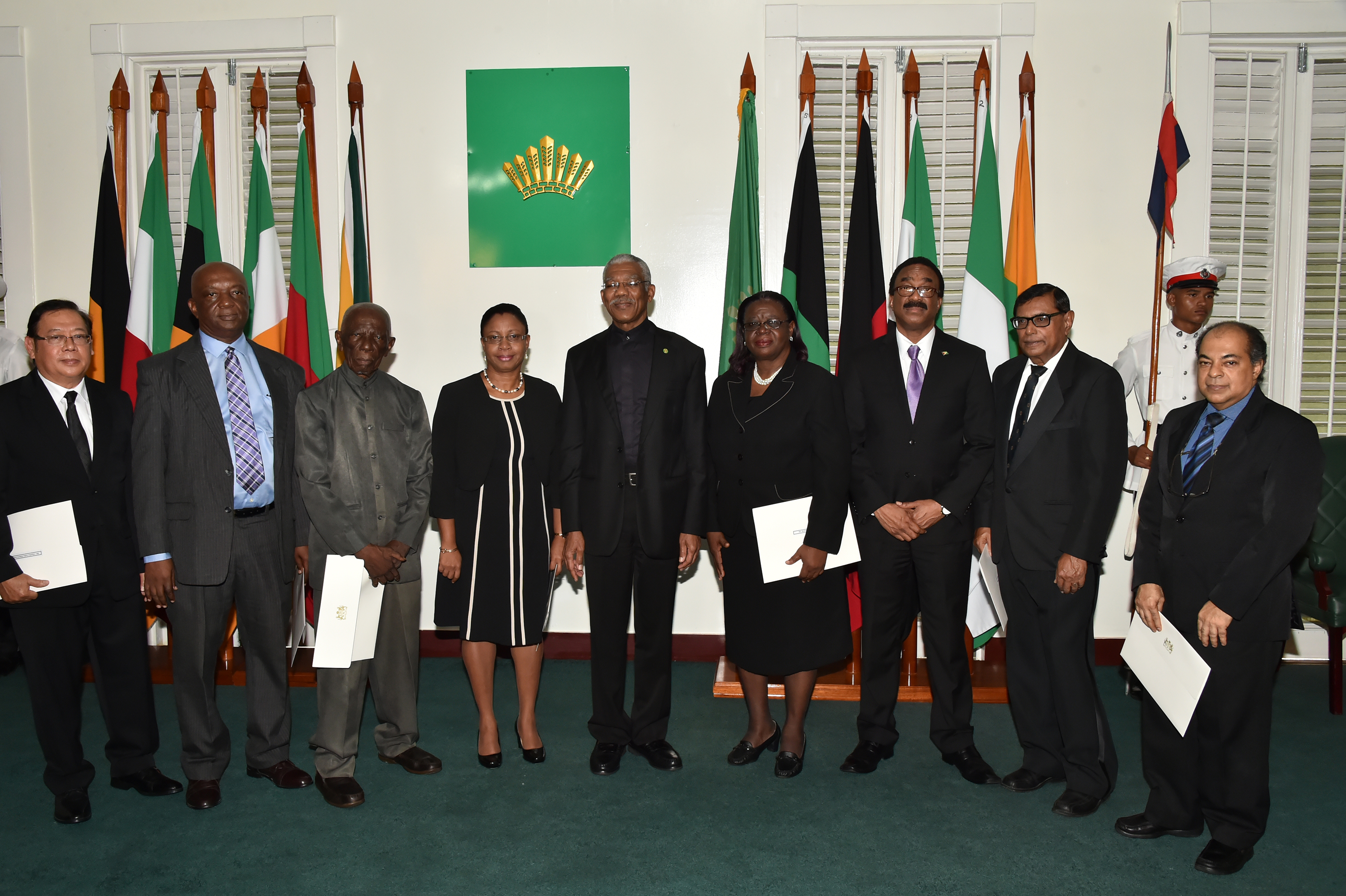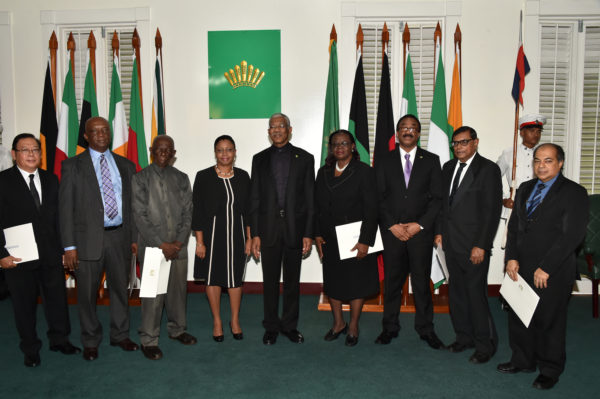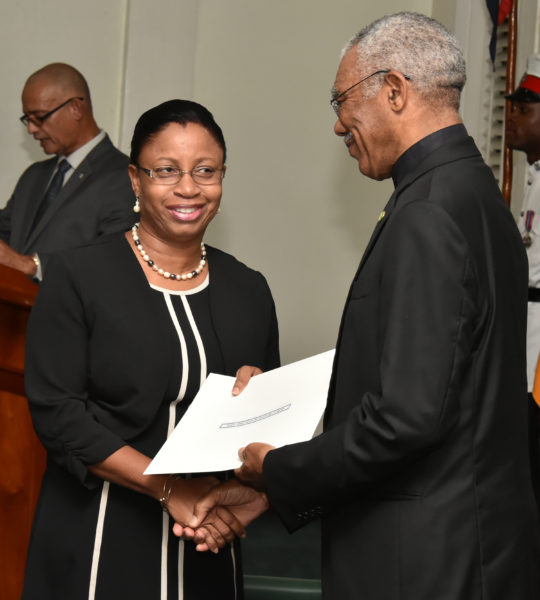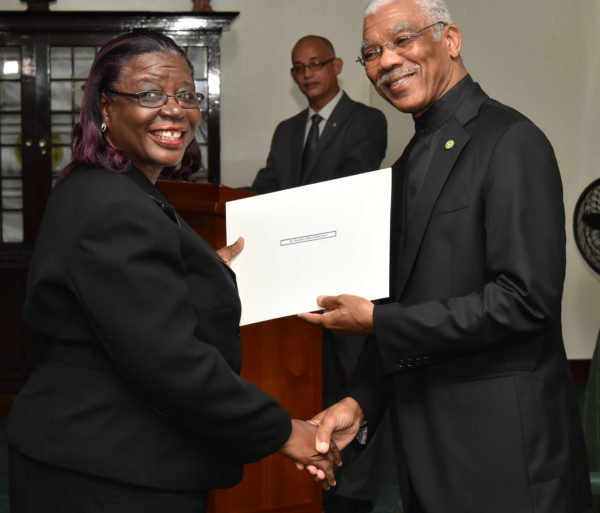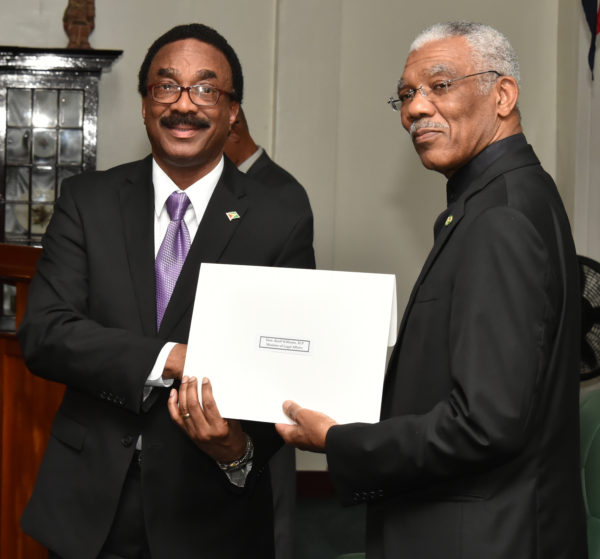It is a travesty that during Guyana’s 50 years of independence, no woman lawyer was ever named a Senior Counsel (SC), President David Granger said yesterday, moments after presenting Instruments of Appointment to eight of the nine legal practitioners, who he recently elevated to this status.
On New Year’s Eve, Granger made public a list of new SC, including three women. The last batch of appointments were made 20 years ago in 1996, but the honour will now be given every year.
Those receiving their official appointments yesterday were Neil Aubrey Boston, Charles John Ethelwood Fung-A-Fat, Alison Roxane McLean George-Wiltshire, Clifton Mortimer Llewellyn John, Rafiq Turhan Khan, Vidyanand Persaud, Rosalie Althea Robertson and Attorney General Basil Williams. The ceremony was held at State House. Absent was retired judge Claudette Margot Cecile Singh who is currently abroad.
The President said he could find no reason why “… since independence we couldn’t find a qualified woman attorney to grant the Senior Counsel to.” He was responding specifically to public comments about George-Wiltshire, who is a sitting judge.
Former AG Anil Nandlall in the hours after Granger’s announcement had said that this particular appointment “runs contrary to every canon of practice and precedent which dictate that Senior Counsel must be practising lawyers. For this reason the Chief Justice of Trinidad and Tobago Ivor Archie was forced to relinquish his appointment as Senior Counsel because he was a judge and not a practising lawyer when he was appointed. Kamla Persad-Bissessar was forced to do likewise because when she was appointed Senior Counsel, she was the Prime Minister of Trinidad and Tobago.”
He stated too that Justice Wendell Kangaloo of Trinidad was a sitting judge when he appointed SC and he refused the appointment.
But Granger noted that in the case of Justice George-Wilshire, she had served for several years in the Chambers of the Director of Public Prosecutions and were this “a normal jurisdiction during those years she would have had the SC long ago.” He called the non-elevation of such a person with her level of qualifications a “travesty.”
He added, “Similarly Justice Claudette Singh did serve as Solicitor General and in normal jurisdictions these were qualifications that would have enabled them to earn that award.” He stressed that what he had done was to correct an “abnormal” situation.
Justice George-Wiltshire, who was admitted to the Bar in October 1990, has served as a Senior State Counsel, Assistant Director of Public Prosecutions, Deputy Director of Public Prosecutions and Director of Public Prosecutions.
Shortly after the Instruments were handed out, Granger told the gathering which consisted of senior members of the judiciary, Senior Counsel Charles Ramson Snr and Bernard De Santos, relatives and friends of the newly appointed SC and government officials that the elevation to this status is a symbol of nationhood and an important personal obligation.
“It promotes a sense of national identity by defining who we are. It celebrates the values for which we stand. It is a force of integration which identifies us as a nation of ideals. It is not perfunctory or ornamental,” he said.
The elevation is a mark of respect, of recognition and of reward for the accomplishments of those who have given, and who continue to give, selfless service to our nation, he said. He informed that the average individual service was 37½ years and the accumulated service is 338 years.
“You embody a massive amount of legal education and experience. You are exemplars of a fine tradition of an honourable and ancient profession,” he said adding that it was his duty as President to pay respect to those to whom respect was due. “I am a trustee of the traditions which sustain society,” he said.
He said too that it was his obligation, not an option, to respect the national system of honours and that failure to confer these awards, “whether the result of caprice or malice, would constitute a dereliction of duty on my part, the debasement of our identity of nationhood and an affront to our citizens.”
Regularity
He stated that he will with regularity and consistency, recognize and reward the work of deserving citizens by conferring honours on the basis of merit. He then announced that SC elevations will be done annually and this was met with applause.
Granger stressed that the elevation reflects ambitions and aspirations to improve the quality of life, to promote professional service and to encourage emulation and it represents the desire to share a sense of national identity by defining who we are and by proclaiming the values for which we stand and to be more fully integrated as a community of citizens with common ideals.
He told the new SC that their elevation will not be devalued with the passage of time. “The parchment with which you have been presented will not disintegrate with age. The acclaim of the public will not be discredited. The silk which you will wear proudly will not become shabby and ragged,” he said adding that the elevation is a reflection of the respect and reverence of a grateful nation.
Later, Granger told the media that the nine persons were selected based on merit. “I did consult with certain persons, senior persons and some recommendations are made… There is no law, no constitutional responsibility on anybody’s part and I am advised that these are persons who served.”
Meanwhile Stabroek News spoke with some of those appointed.
Justice George-Wiltshire said she was honoured. She, like others, had applied since 2003 when person were invited to do so. “Years have passed. I did not expect it, so it is good to get surprises and this was definitely one but it is an honour,” she said. Asked if she knew how she came to be selected, the judge said she was unsure but knew there was a list in 2014 and she was surprised that her name was still on it, “bearing in mind that I am and was then a sitting judge but I guess maybe that list might have been submitted. I didn’t ask too many questions…”
With regard to giving advice to aspiring young women lawyers, she said that foremost they must be committed. She said that whenever she admitted new lawyers to the Bar, she would always advise them to be a “lawyer’s lawyer,” meaning that what was looked for was scholarship, research, presentation in the court, deportment and how they carry themselves.
Ninety-two-year-old John might be the oldest attorney ever to be elevated to SC status here. He was admitted in 1952 first as a solicitor and then as a barrister and has practised both in the High Court and the Magistrate’s Court
He told reporters that he wasn’t surprised when he was informed about the elevation. “No! I was not surprised, because I said I did 65 years… I am president of the World Peace Through Law Centre which deals with settling international disputes by legal means and I am trying to write books on land as well local government law so I am not surprised at all,” he said.
Boston who was the first to receive his Instrument of Appointment told reporters after the ceremony had ended that he “expected this many years ago.”
He was admitted to the Bar in November 1982 and has served as a trial lawyer for over 34 years.
According to Boston in 2005, the then Chancellor Desiree Bernard had invited him to apply for Silk, but it took some time for him to do so. He said that subsequent to that a Senior Counsel Committee was established and it planned that there would be two sets of appointments with six persons followed by another four. That committee, he told reporters, dissolved before this plan materialized. “After the dissolution of that committee there wasn’t a resurrection of another committee but …names were proposed and [the then] President [Donald] Ramotar was contemplating appointing eight of us… and that never materialized,” he explained.
Asked about the process through which he and the others were chosen, Boston said the present system is that the President requests the judges of the Supreme Court to nominate attorneys who they feel have reached the “threshold to be admitted as silk.” He said the judges would pass their recommendations to the Chancellor who put all together and forward same to the President and from that list the final selections are made. “The list may go but that doesn’t necessarily mean he will extract your name,” he said.
The Ministry of the Presidency in making the announcement had said that those appointed were learned in the law in Guyana. The appointment were made “on account of their exemplary experience, erudition, excellence and diligence in the practice of the law.”
Fung-A-Fat, the ministry said was admitted to the Bar in August 1983 and served as Parliamentary Counsel and Deputy Chief Parliamentary Counsel for over 33 years. Khan was admitted to the Bar in November 1984 and has served as an advocate, member and Co-Chairman of the Legal Practitioners Committee. Persaud, who was called to the Bar in London in July 1976 and admitted to the Bar in Guyana in October 1976 has served as an arbitrator in disputes and in private practice for 40 years. Robertson, who was admitted to the Bar in November 1983 served as a Legal Advisor and Corporate Secretary for 33 years and as Registrar of Lands. Justice Singh who was called to the Bar in London in 1973 and admitted to the Bar in Guyana in 1976, served as the Deputy Solicitor General, Puisne Judge and Justice of Appeal and has displayed leadership in spearheading the Modernisation of the Justice Reform Project, and is the Guyana Police Force’s Legal Advisor. Williams, who was admitted to the Bar in October 1983, has practised both criminal and civil law for over 33 years.
